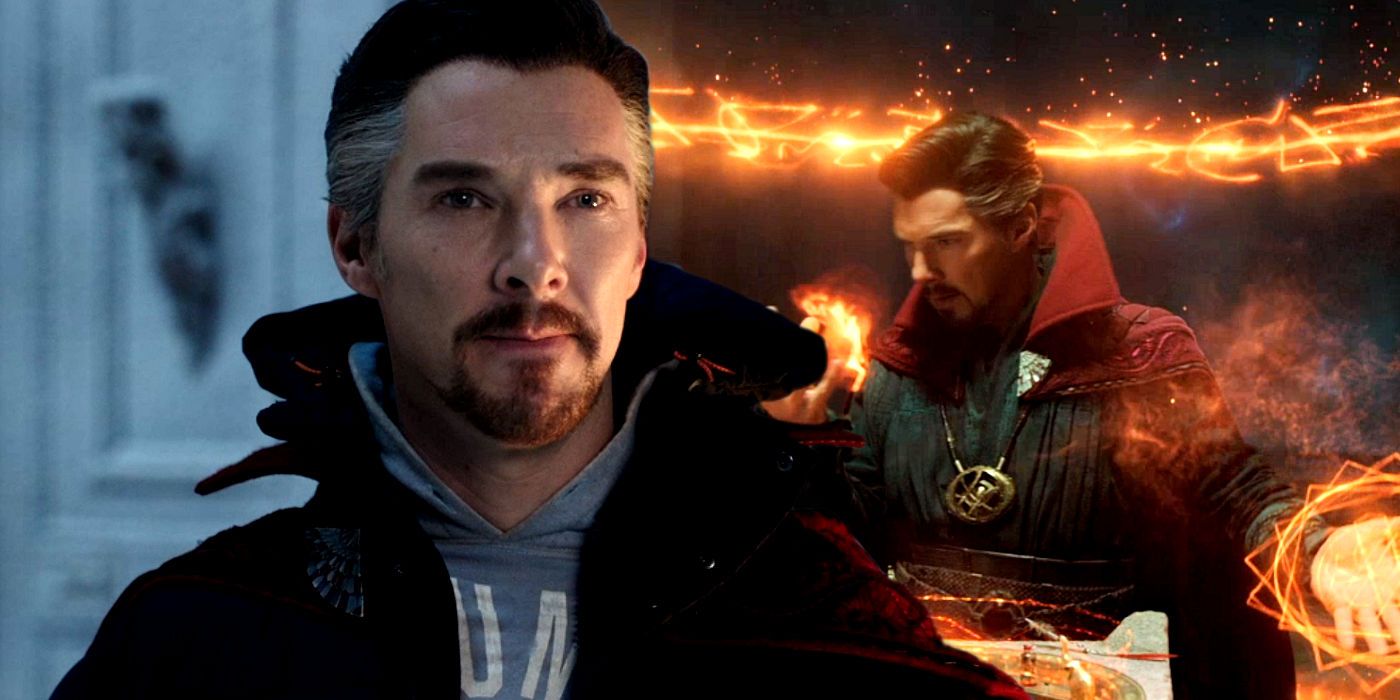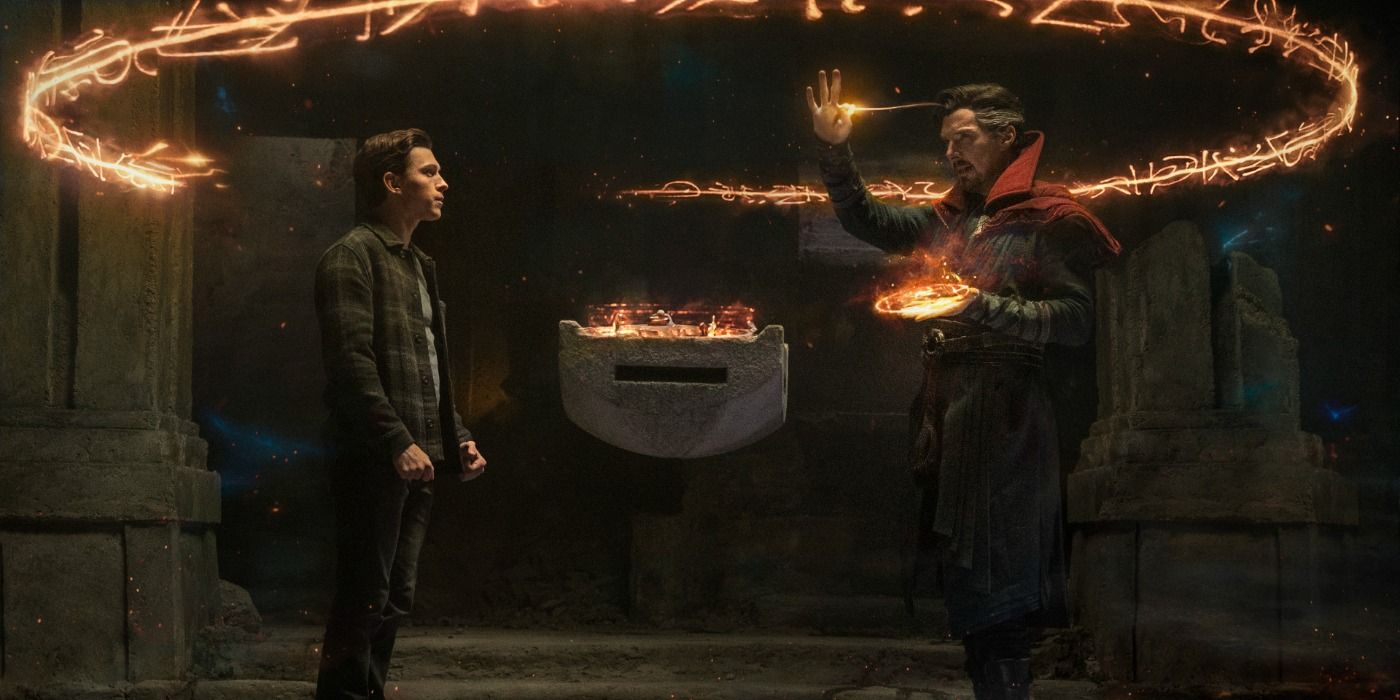Doctor Strange appears to be the one responsible for breaking the Multiverse in Spider-Man: No Way Home - but how exactly did his spell backfire so badly? The MCU's Multiverse is a fragile thing, with (currently) no less than three causes of the upcoming Multiverse of Madness. The pressure on the Multiverse began in WandaVision when Wanda Maximoff became the Scarlet Witch and unwisely began turning the pages of the Darkhold. It continued with Loki inciting a Multiversal war between different iterations of Kang and looks set to continue in Spider-Man: No Way Home when Doctor Strange proves he really isn't fit to be called Sorcerer Supreme just yet.
The trailer for Spider-Man: No Way Home shows Peter Parker going to Doctor Strange for help. His secret identity has been revealed to the world, he's standing trial for the supposed murder of Mysterio, and his personal life is collapsing now his identity is public knowledge. He hits upon the idea of asking for magical assistance, hoping Strange can rewrite history. Wong is against the idea, cautioning Doctor Strange the spell is too dangerous, but Strange proceeds once his friend has stepped through a portal - and it inevitably goes badly wrong. It all seems to be Parker's fault, with Spider-Man unable to keep quiet long enough for Strange to perform a complicated spell.
Yet something about the No Way Home trailer doesn't add up. On the face of it, Doctor Strange is performing a spell that should simply erase people's memories and that's all; so why did that particular magic seem to break the entire Multiverse too? There seems to be something else going on - something that made this spell even more dangerous.
Doctor Strange Isn't Just Erasing Memories
The key, however, is to understand that Doctor Strange isn't just trying to wipe memories with the spell he performs. That wouldn't be enough, because the internet would still be filled with proof Peter Parker is actually Spider-Man - this includes everything from J. Jonah Jameson's initial revelation on the Daily Bugle to interviews with Peter's school friends discussing their reactions. Those who Googled "Spider-Man identity" would immediately hit a wealth of articles, YouTube reaction videos, and photos of Peter. It wouldn't take at all long for the story to get traction, and the cat to come out of the bag once again - this time with the news also being that Spider-Man had somehow wiped the world's memories, which would undoubtedly be seen as a sinister act that proved his guilt in Mysterio's death. Thus Doctor Strange can't simply be performing a spell that erases memories; he is rewriting reality on a fundamental level.
It's reasonable to assume this is the kind of dangerous spell a sorcerer could only learn from the Book of Cagliostro. This was seen in Doctor Strange, where the title character discovered it in the Ancient One's collection of forbidden tomes. Cagliostro was clearly a sorcerer who was willing to take risks because he had experimented with the Time Stone, conducting magic he learned - likely the hard way - could destroy the fabric of spacetime (indeed, it's no coincidence that, in Marvel's What If...?, a version of Doctor Strange destroyed his universe when he sought out more of Cagliostro's magic). No surprise Wong cautioned Strange against performing this magic for Spider-Man, fearing the consequences.
What Went Wrong With Doctor Strange's Spell?
This would explain why Doctor Strange's spell had the potential to wreak havoc, and why it was a bad idea for him to conduct such intricate spellcraft without first gagging Parker. In rewriting the course of history, Doctor Strange is essentially attempting to impose his will on the direction of the entire MCU timeline, an act that demonstrates he is still just as proud and arrogant as he was back when he won acclaim as a surgeon. But, of course, this theory raises the question of just how the magic backfires.
The Spider-Man: No Way Home trailer may offer a subtle hint when Strange furiously tells Spider-Man, "The problem is you, trying to live two different lives." Most viewers have assumed this is a reference to Peter's attempt to keep his secret identity, but in reality, it could point to the Multiversal consequences of Doctor Strange's spell. In Marvel's What If...?, there is one timeline in which the Ancient One attempted to preserve reality by splitting Strange's timeline, allowing both a good and evil version to exist in the same reality. The Ancient One was a far more skilled practitioner of the magic arts than Strange, having had centuries to practice, and she too had read the Book of Cagliostro; consequently, she pulled it off, although even she admitted such magic is “exceedingly dangerous.” Something similar could have happened in No Way Home; two timelines could have wound up co-existing chaotically, leading Spider-Man to literally attempt to live two different lives.
From Peter Parker's perspective, such an outcome would potentially be the best of both worlds; he gets the benefits of his MCU secret identity when he wants them, and loses them when he doesn't. Yet such a chaotic status quo would be inherently unstable, and the entire timeline would naturally begin to collapse around him if this was the case. This could well explain why characters and villains associated with Spider-Man in other timelines are drawn into the MCU since Spider-Man would essentially become the focal point for an entire Multiverse's worth of instability. It's also quite likely other versions of Spider-Man would ultimately be drawn into the MCU as well in this scenario which, of course, fits in with the many reports of Tobey Maguire and Andrew Garfield's iterations of Spider-Man appearing in Spider-Man: No Way Home as well.
At the moment, Doctor Strange's magic remains a mystery. Still, this theory is the best explanation so far of how it would work, and why a supposed memory spell can cause a Multiversal catastrophe. The nature of the backfire is still more hypothetical, in part because Marvel doesn't seem to have planned out a consistent model of their Multiverse, so it's difficult to say whether Marvel's What If...? really did establish a precedent ahead of Spider-Man: No Way Home. Still, it all fits with the details that are known to date, meaning it could well be accurate.









